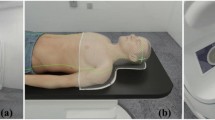Abstract
Objectives
Pre-treatment patient education has been shown to decrease anxiety and enhance comprehension. Our pilot study evaluates the impact of VERT™, a virtual environment education tool, on these endpoints.
Methods
Twenty-two patients with prostate cancer being treated with radiotherapy completed a 16-question comprehension/anxiety survey. Patients proceeded to VERT™, modeled after a flight simulator using realistic sounds and views. The test was then repeated. A power analysis determined that enrolling 20 patients achieves 80% power to detect an effect size of 0.89 with a Bonferroni-adjusted significance level of 0.003125 using a one-sided one-sample paired t test to analyze differences between individual pre/post-test scores. Descriptive statistics were reported and effect size was computed.
Results
Pre/post-test measures for all questions were statistically significant, favoring our hypothesis of improved education and reduced anxiety following virtual simulation except three measures of anxiety (low in both assessments). Baseline anxiety was highest for treatment precision, which also demonstrated the most significant pre/post-intervention improvement.
Conclusion
Decreased anxiety and improved comprehension influence patient-reported satisfaction and can contribute to quality assurance. Implementation of virtual simulation was successful in improving comprehension and reducing anxiety. Development of personalized, site-specific, clinic-based virtual modules is a long-term goal of this pilot study.


Similar content being viewed by others
References
https://www.cancer.gov/about-cancer/treatment/types/radiation-therapy/radiation-fact-sheet. Accessed 2 Dec 2016
Andersen BL, Tewfik HH (1985 Apr) Psychological reactions to radiation therapy: reconsideration of the adaptive aspects of anxiety. J Pers Soc Psychol 48(4):1024–1032
Häggmark C, Bohman L, Ilmoni-Brandt K et al (2001) Effects of information supply on satisfaction with information and quality of life in cancer patients receiving curative radiation therapy. Patient Educ Couns 45:173–179
Poroch D (1995) The effect of preparatory patient education on the anxiety and satisfaction of cancer patients receiving radiation therapy. Cancer Nurs 18(3):206–214
Geinitz H, Marten-Mittag B, Schafer C et al (2012) Patient satisfaction during radiation therapy. Correlates and patient suggestions. Strahlenther Onkol 188:492–498
Lamszus K, Verres R (1995) Social support of radiotherapy patients in emotional stress and crisis situations. Strahlenther Onkol 171(7):408–414 German
Moerman N, van Dam FS, Muller MJ et al (1996) The Amsterdam Preoperative Anxiety and Information Scale APAIS. Anesth Analg 82:445–451
Halkett GKB et al (2013) Pilot randomised controlled trial of a radiation therapist-led educational intervention for breast cancer patients prior to commencing radiotherapy. Support Care Cancer 21.6:1725–1733
Janis IL (1958) Psychological stress: psychoanalytic and behavioral studies of surgical patients. Wiley, New York
Zeguers M, de Haes HC, Zandbelt LC et al (2012) The information needs of new radiotherapy patients: how to measure? Do they want to know everything? And if not, why? Int J Radiat Oncol Biol Phys 82:418–424
Hahn CA, Fish LJ, Dunn RH et al (2005) Prospective trial of a video educational tool for radiation oncology patients. Am J Clin Oncol 28:609–612
https://www.nccn.org/patients/guidelines/cancers.aspx. Accessed 1 Dec 2016
https://www.astro.org/Patient-Education.aspx. Accessed 1 Dec 2016
Harrison DE, Galloway S, Graydon JE et al (1999) Information needs and preference for information of women with breast cancer over a first course of radiation therapy. Patient Educ Couns 38:217–225
Sulé-Suso J, Finney S, Bisson J et al (2015) Pilot study on virtual imaging for patient information on radiotherapy planning and delivery. Radiography 21(3):273–277
Author information
Authors and Affiliations
Corresponding author
Ethics declarations
Funding
No funding was received for this study.
Conflict of interest
The authors declare that they have no conflict of interest.
Ethical approval
This article does not contain any studies with animals performed by any of the authors. All procedures performed in studies involving human participants were in accordance with the ethical standards of the institutional and/or national research committee and with the 1964 Helsinki Declaration and its later amendments or comparable ethical standards.
Informed consent
Informed consent was obtained from all individual participants included in the study.
Additional information
Matthew Marquess and Shirley Pinegar Johnston are co-primary authors
Rights and permissions
About this article
Cite this article
Marquess, M., Johnston, S.P., Williams, N.L. et al. A pilot study to determine if the use of a virtual reality education module reduces anxiety and increases comprehension in patients receiving radiation therapy. J Radiat Oncol 6, 317–322 (2017). https://doi.org/10.1007/s13566-017-0298-3
Received:
Accepted:
Published:
Issue Date:
DOI: https://doi.org/10.1007/s13566-017-0298-3




